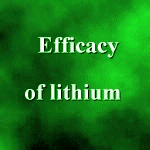
Lithium revisited
Sir: Scepticism about the evidence base for the value of lithium is overdue and well reviewed in the editorial by Moncrieff (1995). My doubts are increased by the methodological problems of removing bias from randomised controlled trials of lithium.
Although patients and healthy volunteers do not seem to be very good at identifying whether they are taking lithium or placebo in a clinical trial (Calil et al, 1990), it is the unblinding of raters which produces bias in clinical trials. In a study of lithium prophylaxis, patients' relatives guesses far exceeded chance expectancy (Stallone et al, 1975). Contact with trial lithium patients, therefore, can lead to unblinding.
As the Cochrane Collaboration proceeds in its systematic review of clinical trials it has sought to determine whether controlled trials are properly randomised. In the Cochrane Preganancy and Childbirth Database evidence of complete randomisation is associated with less treatment effect (Schultz et al, 1995). However, it may be necessary to conclude that a truly double-blind trial of lithium cannot be performed (Double, 1995).
Calil HM, Zwicker AP & Klepacz S (1990) The efects of lithium carbonate on healthy volunteers: Mood stabilization? Biological Psychiatry 27 711-722
Double DB (1995) Unblinding in trials of the withdrawal of anticholinergic agents in patients maintained on neuroleptics. Journal of Nervous and Mental Disease 183 599-602
Moncrieff J 91995) Lithium revisited. A re-examination of the placebo-controlled trials of lithium prophylaxis in manic-depressive disorder. British Journal of Psychiatry 167 569-573
Shulz KF, Chalmers I, Hayes RJ et al (1995) Dimensions of methodological quality associated with estimates of treatment effects in controlled trials. Journal of the American Medical Association 273 408-412
Stallone F, Mendlewicz J & Fieve RR (1975) Double-blind procedure: an assessment in a study of lithium prophylaxis. Psychological Medicine 5 78-82